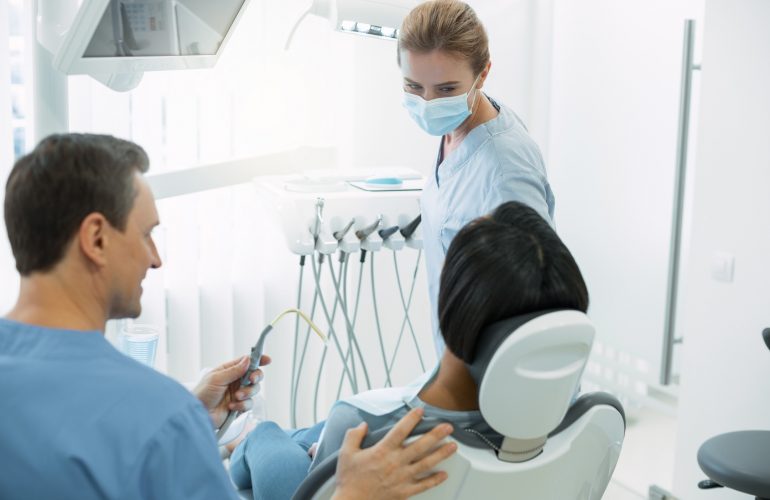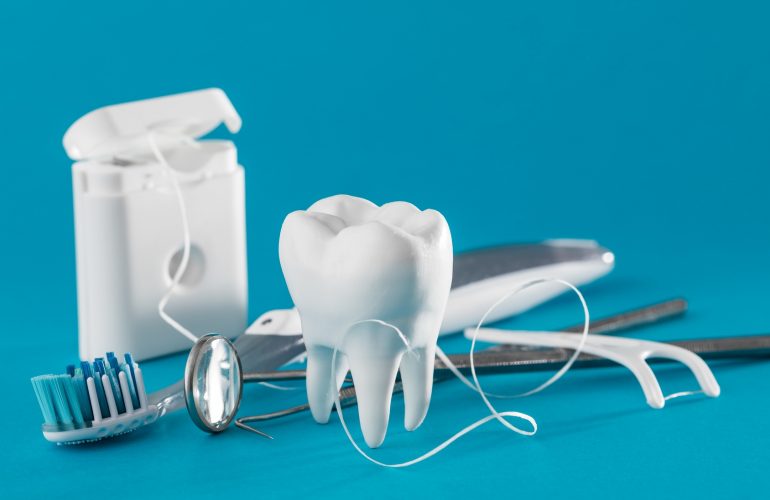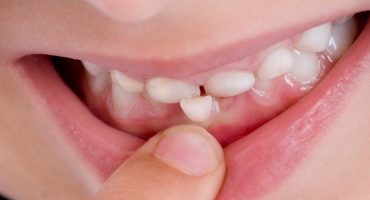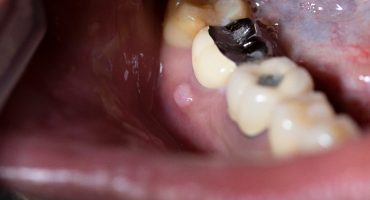A toothache is usually caused by a damaged or diseased tooth. In rare cases, however, diseases in the upper or lower jaw, in the neighboring area of the head, the paranasal sinuses or the eyes can be the cause of toothache. Very rarely, painful teeth can also be harbingers of a heart attack. Therefore, toothache should not be taken lightly, but should be expertly examined and treated by a dentist.
What does toothache mean?
Toothache can occur in many different forms and types. The most common is probably the short, pulling and stinging pain when eating cold or warm foods or drinks. The pain is unpleasant at first, but evaporates by itself as fast as it has come. This form of toothache is the most common. It is often taken lightly or completely ignored, as there is no detectable disease or inflammation in the oral cavity to the naked eye.
If toothache is triggered by an injury or inflammation in the mouth area, the pain is burning, tearing and long-lasting. Often it is not the tooth that hurts directly, but the gums, periodontium or jawbone. Colloquially, however, this makes no difference, because one always speaks of toothache, no matter which part of the jaw exactly causes the pain.
By far the most uncomfortable are toothaches that occur without impact and noticeable inflammation or external injury. They usually start directly from the inside of the teeth or the tooth root and are rather untouchable for external pain relief. The nerve inside the tooth is already so irritated that it continuously sends painful stimuli to the body. These must of course be treated, which makes a visit to the dentist indispensable.

Causes of toothache
The causes of toothache are manifold, as they are only a symptom and not a specific disease. Toothache causes can be simple illnesses such as sensitive teeth, but also more serious illnesses such as periodontitis, rheumatism, diabetes or a threatening heart attack.
Main cause of toothache: dental problems
Probably the most common cause of toothache is the lack of protective enamel. If it is missing, the dentinal tubules are exposed and there is direct access to the dental pulp inside. Here the tooth nerve is situated, which can already be irritated by the smallest external influence (heat and cold, but also acids and sweets) and subsequently sends pain signals to the body. Some other diseases of the body, such as Diabetes or certain autoimmune diseases sometimes also affect the enamel density. Sensitive teeth and resulting toothache are no stranger to most sufferers of these diseases.
The decomposition of the enamel also often occurs with the development of tooth decay on the teeth, which is why permanent toothache as a side effect of caries are not rare. The caries does not always have to be seen from the outside, it can also hide between the teeth or under fillings and crowns and thus trigger the unpleasant pain.
Possible causes are also inflammations of the gums (gingivitis), the periodontium (periodontitis) or the dental pulp (pulpitis). However, it does not hurt the tooth directly, but the gums, the periodontium or the dental pulp. The gums or dental pulp swell, accompanied by a more throbbing pain that the tooth nerve sends to our body. Heat intensifies this type of toothache, which is why they are usually very distressing for the person concerned, especially at night.
Another form of toothache children with growing teeth are experiencing. Infants and toddlers are in considerable pain when teething, which means breaking the deciduous teeth of the gums. After that preschoolers have to deal first with the often painful loss of the deciduous teeth and shortly afterwards with the emergence of the permanent teeth. And even adults are not completely spared from this type of toothache. If wisdom teeth break through, this is in many cases associated with moderate to severe pain.
But also irregularly grown and crooked teeth, too tight braces or a poorly fitting prosthesis or bridge can cause toothache. In all cases, there is a pressure on the jawbone, for which was originally not intended. Of course, with the wrong and overburdening of the bone and teeth, the body reacts with pain to signal that something is not alright.
Jaw, oral cavity and teeth: cause of toothache!
Discomfort on the jaw and dental problems are in most cases reciprocal, which is easy to understand. Inflammation of the gums or the periodontium quickly attacks the jaw, if not countered and treated in time. The danger of dangerous bone inflammation in the upper and lower jaw rises. In rare cases, jawbone inflammation can also be the result of injury, radiation treatment or surgery (eg, root canal treatment). In all cases, the result is the same for the person affected: the inflamed jawbone hurts badly.
Also, malfunction of the jaw (a so-called craniomandibular dysfunction) can lead to pain, which is often simply dismissed as a toothache. A malposition between the skull (cranium) and the lower jaw (mandible) can cause a painful restriction of the temporomandibular joint. In such a case it is not very easy for the patient to locate the pain accurately. It radiates into both the cranial and the oral region and is therefore mistakenly dismissed as headache and toothache, although the cause is entirely different.
Ultimately, of course, abscesses or growths in the jaw cause indefinite toothache. Depending on where they are located in the jaw, they press on tooth roots and tooth nerves causing pain. While the abscesses and growths themselves are not painful, the patient now suffers from toothache instead, which is not caused by a defect directly on the tooth.
When head and teeth hurt at the same time
Pain from the entire head and face area can continue right down to the teeth. Those who suffer from headaches or migraines sometimes feel a pull or a dull pressure at certain places in the jaw. In the case of headache or migraine, the trigeminal nerve (the fifth cranial nerve), which is responsible for the eyes, upper and lower jaw, is often affected. It is irritated and sends painful impulses to the brain pretending to be in pain and toothache, which are actually not present.
Pain caused by sinusitis or middle ear infections occasionally radiate into the teeth or the upper jaw. In some people, even a simple cold is enough to cause atypical toothache. Even in these cases, the trigeminal nerve is the cause of the often difficult to localize pain in the teeth and jaw.
Toothache as a harbinger of heart attack
Heart attack pains, as in most cases, not only affect the chest, but may also radiate into the back, arm, abdomen, and jaw. So if your teeth are hurting and there's still shortness of breath, cold sweats, nausea and circulatory failure, then toothache can be a warning sign of an impending heart attack. In this case, the emergency doctor must be notified immediately!
Summary of the main causes of toothache
Causes of pain in the tooth and jaw area
- Exposed tooth necks
- Missing or defective enamel
- Caries
- Gingivitis
- Periodontitis
- Inflammation of the tooth roots and root tips
- Improperly placed or fitting braces, bridges and prostheses
- Malformations and crooked teeth
- Breaching wisdom teeth
- Teething in children
- Bone inflammation in the upper or lower jaw
- Malposition of the jaw (craniomandibular dysfunction)
Causes of toothache from the oral, head and facial region
- Inflammation of the oral mucosa
- Abscesses and growths in the jaw
- Inflammation of the paranasal sinuses
- Middle ear infections
- Headache and migraine
- Inflammation of the facial nerve (trigeminal nerve)
Other, rather rare triggers of toothache
- Harbinger of a heart attack

How does the dentist treat toothache?
For permanent problems that affect the teeth and the dentition, the dentist should always be the first point of contact. Through a targeted consultation and a subsequent examination of the oral cavity, he will investigate the causes. If superficial examinations of the oral cavity with a mirror and examination probe are not sufficient, the dentist will resort to the preparation of an X-ray. Here subliminal defects of the teeth and the jaw, but also of the temporomandibular joint can be visualized. If no causes for the toothache can not be determined, the dentist will issue a referral to another specialist such as an orthodontist, taking into account other emerging symptoms, e.g. treat a maladjustment of the jaw causing the toothache.
When visiting a dentist, it is important that you can describe your pain precisely. The dentist needs to know exactly where it hurts, how the pain feels (whether it's stinging, burning, dull, piercing or throbbing), and which areas additionally hurt. Are there any complaints such as swelling or inflammation or pain in other areas of the body? All this the dentist needs to know to offer a correct diagnosis about the actual cause of the toothache.
When to go to the dentist?
If one of the following points applies to you, you should make an appointment with your dentist immediately:
- The complaints continue despite careful oral care
- The pain occurs in ever shorter intervals
- The surroundings around the tooth is red and swollen
- The pain occurs frequently and apparently without reason
- The gums bleed again and again when eating and brushing
- There are sudden stinging pains that do not disappear
- There is pain in the jaw, head or face
If, in addition to the toothache, there are also sudden pains in the chest, arm or back area and circulatory problems, call the emergency hotline immediately, because these symptoms can be the harbingers of an imminent heart attack.

Treatment of toothache
Dental therapy for toothache
There is an individual solution for every dental problem. Therefore, it is important that the dentist first clarifies the actual cause of the toothache before suggesting and performing a specific treatment. The type of treatment is always based on the underlying cause identified. So it is not enough, e.g. to treat inflammation of the gums when toothache is actually caused by tooth decay, which therefore remains undetected and untreated.
Often a simple treatment at the dentist, however, is not enough to successfully treat the toothache. Here another specialist is consulted, who recognizes and treats the causes of the pain, which lie outside the oral cavity and therefore outside the therapy area of the dentist.
If you treat the underlying conditions such as headaches, migraines or inflammations of the sinuses or the middle ear, the toothache will disappear on its own, as long as there are no other diseases that causes this pain. The individual therapeutic approaches are therefore conditioned by the actual illness that triggers the toothache.
Temporary cure of toothache with remedies
Toothache can be treated short-term with medication. Painkillers such as acetylsalicylic acid (ACC), paracetamol and ibuprofen are suitable for severe symptoms. If an obvious inflammation is the cause of the toothache, then also anti-inflammatory drugs such as Voltaren and Diclofenac can be taken instead, which also have an analgesic effect. However, since all painkillers treat only the symptoms and not the cause and should not be taken over a long period of time without medical attention, they can not replace a visit to the dentist.
For minor ailments, natural remedies also help very well in pain relief. Clove oil, which is applied directly to the sore spot in the mouth, is one of the best known herbal remedies. To fight inflammation in the mouth, chamomile extract or arnica essence, which like the clove oil is applied directly to the inflamed area. Also a cold compress, which is placed on the aching side from the outside, can also have a decongestant and analgesic effect. You should refrain from hot drinks such as tea or coffee, because they only aggravate the pain unnecessarily.
Proper dental care is often the best therapy
Thorough oral hygiene is often the best therapy to treat and prevent toothache. Teeth should be cleaned at least twice a day. Electric toothbrushes are best suited for this purpose in conjunction with anti-inflammatory, antibacterial or fluoridated toothpastes. The correct use of the electric toothbrush, however, should be explained before the first use by the dentist, so as not to injure the gums or tooth enamel.
You should not forget the interdental spaces when cleaning. However, they are difficult to reach from the toothbrush, which is why dental floss or so-called interdental brushes are used. Also their professional use should be shown by a dentist. Supportive special mouthwashes should be used such as listerine, which have both an antibacterial effect and anti-inflammatory effect.
Weitere Beiträge

Dental Accident
Dental accidents happen more often than you might think: especially during leisure time and during sporting activities, it can very quickly lead to tooth injury. All age groups are affected in principle - children, adolescents and active athletes, however, in particular.



